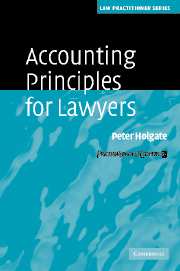Book contents
- Frontmatter
- Contents
- Acknowledgements
- Glossary of terms
- Part I The accounting environment
- 1 Introduction
- 2 UK GAAP and international harmonisation
- 3 The legal framework for accounting
- 4 Substance over form
- 5 The accounting profession and the regulatory framework for accounting and auditing
- 6 Communicating accounting information
- 7 Current trends in accounting
- Part II Some specifics
- Appendices
- Index
1 - Introduction
from Part I - The accounting environment
Published online by Cambridge University Press: 28 July 2009
- Frontmatter
- Contents
- Acknowledgements
- Glossary of terms
- Part I The accounting environment
- 1 Introduction
- 2 UK GAAP and international harmonisation
- 3 The legal framework for accounting
- 4 Substance over form
- 5 The accounting profession and the regulatory framework for accounting and auditing
- 6 Communicating accounting information
- 7 Current trends in accounting
- Part II Some specifics
- Appendices
- Index
Summary
Aim of this book
The aim of this book is to explain accounting to lawyers. This means to some extent explaining it as one would to any group of intelligent non-accountants. But I emphasise those aspects that are particularly relevant to the work that lawyers do. For example, chapters 3 and 4 on the legal framework of accounting, and on substance over form, are more detailed than they would be for a general reader. Similarly, the specific subjects covered in Part II reflect the likely interest of lawyers. Mergers and acquisitions, leases, capital instruments and realised profits are all discussed. But the reader will find little on methods of stock valuation and methods of depreciation. Similarly, this book does not deal with accounting for special industries and sectors such as banks, insurance companies and charities.
What is accounting?
Accounting is a broad term. It is used to cover the initial recording of transactions in a company's accounting records, though this is better termed ‘bookkeeping’. Given the almost universal use of computers for record keeping, even this term is itself only literally accurate either historically, when entries were made in books of account or (historically leather bound) ledgers, or in the smallest of businesses.
Information
- Type
- Chapter
- Information
- Accounting Principles for Lawyers , pp. 3 - 11Publisher: Cambridge University PressPrint publication year: 2006
